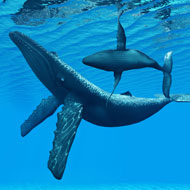Researchers study potential cancer suppression in cetaceans

Researchers sequenced and assembled the genome of a humpback whale.
A study of potential cancer suppression in cetaceans could help researchers discover new targets for preventing cancer in humans.
The research, published in Molecular Biology and Evolution, pulled apart the genome of a humpback whale, along with nine other cetaceans, to reveal how their cancer defences are so effective.
Study leader Professor Marc Tollis from Northern Arizona University said the study found ‘nature has beaten cancer in countless ways across the tree of life’.
He added that scientists can use the information to help find new treatments for human cancers. For example, using the whale version of a protein that can prevent cell growth to develop drugs that shrink tumours in humans.
“Our goal is not only to get nature to inform us about better cancer therapies but to give the public a new perspective of cancer,” Tollis said. “The fact that whales and elephants evolved to beat cancer, and that dinosaurs suffered from it as well, suggests that cancer has been a selective pressure across many millions of years of evolution, and it has always been with us.
“Our hope is that this may change people’s relationship with the disease, which can be painful and personal. It also helps provide even better appreciation for biodiversity. In our current sixth mass extinction, we need all the reasons for conservation that we can get.”
In the study, researchers sequenced and assembled the genome of a humpback whale and compared it to other mammals. These included the blue whale, fin whale, bowhead whale and sperm whale.
They found that some parts of the whale genome contained genes that control the cell cycle, cell proliferation and DNA repair, which are essential for normal cell function. Many of these genes are mutated in human cancers. They also found that the whale genome also evolved many duplications in tumour suppressor genes.
Co-author Carlo Maley from Arizona State University said: “Nature is showing us that these changes to cancer genes are compatible with life. The next questions are, which of these changes is preventing cancer, and can we translate those discoveries into preventing cancer in humans?”
Tollis added: “This suggests that whales are unique among mammals in that in order to evolve their gigantic sizes, these important ‘housekeeping’ genes, that are evolutionarily conserved and normally prevent cancer, had to keep up in order to maintain the species’ fitness.
“We also found that despite these cancer-related parts of whale genomes evolving faster than other mammals, on average whales have accumulated far fewer DNA mutations in their genomes over time compared to other mammals, which suggests they have slower mutation rates.”



 The latest
The latest